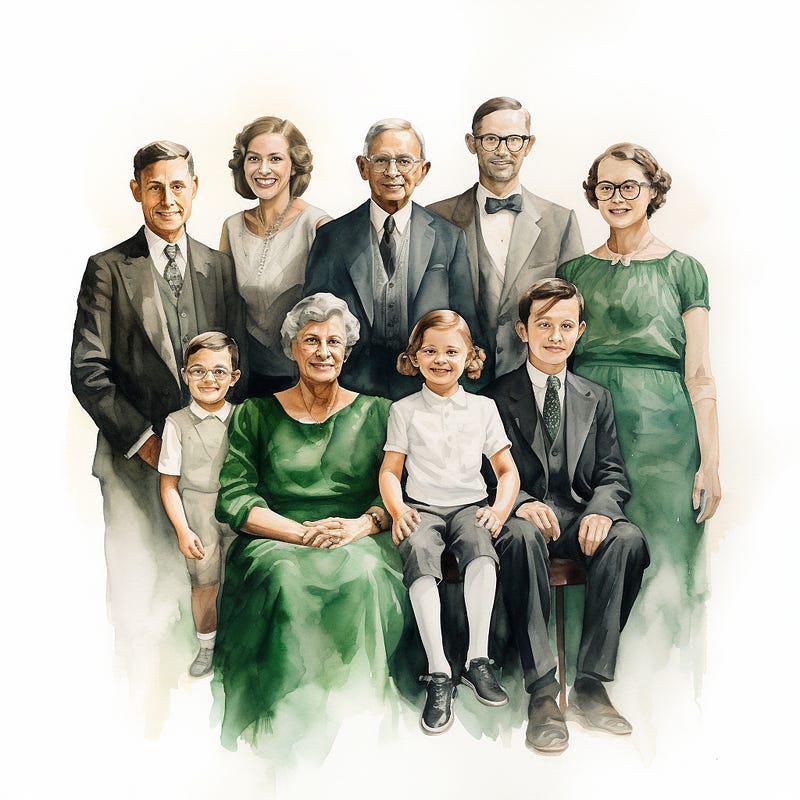What are transgenerational traumas, and how the challenging fates of our ancestors influence our lives today?
From my experience, many problems often root back to some form of transgenerational trauma. In the Hellinger system, this means that we struggle in the present because, at some point in the past, one of our ancestors established a family law or belief regarding a certain topic.
Such laws typically emerge in the collective family consciousness when a family member experiences a severe trauma. Such traumas can include a mother suffering a miscarriage, someone being assaulted or killed, an individual losing all their wealth, being deported, or someone in the family committing suicide, etc.
These laws form because the family member or the family system can’t process the trauma, either due to the magnitude of pain or shame, or because of the lack of someone taking responsibility for their actions. The family tries to ensure that the horrible event doesn’t happen again. This assurance manifests as a law, which everyone subconsciously follows. These laws or beliefs are what later cause problems for the descendants.
However, there are also laws that benefit the descendants. Examples include:
“Be honest and work diligently, and you’ll achieve success!”
“Work persistently and purposefully, and you’ll succeed!”
“Knowledge is something no one can take from you!”
“Live a sober life!”
“Family is more important than your career!”
“Don’t squander money foolishly!”
“Always analyze and strive to find correlations!”
We adopt these beneficial laws, whether explicitly or implicitly, just as we do those that negatively impact our lives. This is why we succeed in some areas and struggle in others.
The only way to change these laws is by using some method to uncover the family event that led to their formation, truly understand what happened and find a new way, a resolution to get through it. By discovering what happened and understanding why the given law was established, we see the reality, remember the event, resolve the buried feelings, reestablish forgotten members of the family, restore order and therefore our psyche is able to move on and realize that the law is no longer needed as there’s no longer anything painful or shameful to hide. This is when the actual processing of the event starts, the blockage ends, and the law becomes redundant. Then the problem in our life resolves.
I understand this might sound odd. For simplicity, think of transgenerational traumas as knots on a 20-foot rope for our psyche. If we need the entire length of the rope to descend a cliff, but several knots shorten it, we won’t make it down. Our only option is to climb back up and untangle each knot to reach our destination. This is what we need to do when we are unable to succeed in finding a lasting, happy relationship, constantly fighting with our child, struggling with our career, finances, etc.
Let’s look at some examples of transgenerational traumas and the possible laws that might form from them. Since every family system reacts differently, various laws emerge in different family systems for the same event. Events that have been properly processed by family members leave no trace in the collective family subconscious.
Returning to the examples:
1.
In a family, a mother died during childbirth. The father was left alone with the child and couldn’t adequately process the grief. To prevent this from happening again, the family system tries to forget the mother (because the pain is too immense), and a law forms stating that sexuality is dangerous and a sin. After all, it was due to sexuality that the child was conceived, which ultimately cost the woman her life. The descendants, then, are likely to struggle with experiencing physical intimacy properly. They might feel ashamed, completely reject it, or swing to the other extreme, engaging in soulless sexual relations with frequently changing partners.
2.
One family member was deported and lost all their wealth. Unable to process the loss, they suffered from it for the rest of their life. Therefore, the family established a law that it’s better not to have money, ensuring they never have to endure such profound loss and pain as their predecessor. Consequently, descendants often struggle with financial problems without understanding the reason.
3.
In another family, a husband abused his wife and the man never took responsibility for his actions. The pain and anger in the woman were so immense that she couldn’t process them, leading to the family law: “Men are dangerous; we don’t choose a strong man.” As a result, women, possibly across several generations, might wear the pants in their marriages, opting for weaker partners, complaining about the man and suffering from not feeling truly feminine.
I could list more examples, but I believe these three cases highlight how transgenerational traumas work. Of course, it’s not only these factors influencing the psyche of current family members, but from my experience, if we’ve tried everything and still can’t solve a problem, it might be worth investigating what happened within the family. It’s not essential to consciously know the story; it will reveal itself during the family constellation or introspection, and we will recognize it, if not the story itself (sometimes we never heard of it from family members), then our current feelings that are connected to it.
– Eszter
Causes of Infertility — Transgenerational Traumas
Home | Notes | Articles | Eszter’s Magic | Literary Bonbons | Short Stories and Guides | Beyond the Book | EWE Issues | Archive | About





